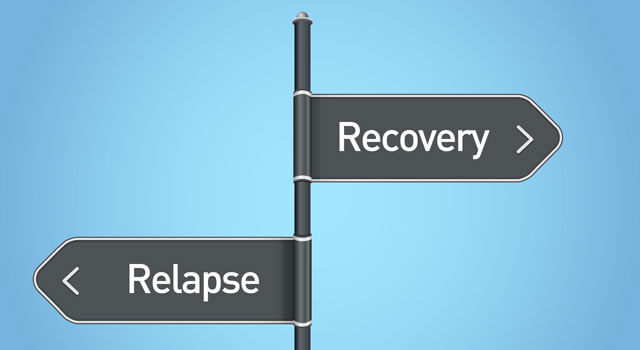If you have just relapsed or admitted to relapsing, first things first, give yourself some slack. Let’s go over some information that will help you calm down during this moment, and then talk about some steps to take moving forward. Remember, right after relapse, the most important thing is getting back on the right track to recovery.
What is Relapse?
The term relapse doesn’t only apply to just drug problems. By definition, relapse is “a recurrence of symptoms of a disease after a period of improvement.” That definition DOES NOT include the words failure, giving up, or losing hope. It just means that the symptoms of your addiction have cropped up again, and its time to work extra hard on treatment.
Let’s turn this relapse into something positive. Instead of viewing it as a setback, we can reframe our point of view. This relapse can be a brand new source of motivation for the ongoing journey of recovery.
Step 1: Right after Relapse, Be Understanding with Yourself
Remember, Relapse is Common!
If you’re feeling guilty or ashamed right after relapse, these facts and statistics might come as a bit of reassurance.
- 40%-60% of all recovering addicts will experience an episode of relapse at some point or another. Interestingly, that’s the same relapse rate for other chronic diseases like asthma, diabetes, and hypertension. All chronic illnesses like these, including addiction, require us to make daily healthy choices. That’s why it’s so easy to relapse on bad days.
- 70%-90% report at least having had one minor slip up. Mistakes happen, but if you realize it quickly enough, you can prevent a minor slip from turning into a full relapse.
- The first 90 days of recovery are the hardest. That’s when cravings are at their peak, and before sober-living becomes second nature. Check out more information about avoiding relapse, and the triggers that can make it more likely.
Step 2: Pick up your phone, and Call for Support!
Perhaps you’ve been out of touch with your support groups, sponsor, friends, or family members lately? If so, right now is the perfect time to dial them up. Isolation and loneliness are two of the biggest risk factors for relapse.
Your recovery is important to others, but it’s easy to forget that. By reaching out and admitting that you’ve relapsed, you can get the help you need in this moment. Your support network will be eager to encourage you and remind you just how valuable your health and safety are to them.
Support feels good; go ahead and pick up the phone!
Step 3: Make a Mental Checklist of all of the Things You Want to Achieve from Recovery
Right after relapse, it’s a good time to try to remember exactly why you wanted to get better in the first place. Whether you started this journey to get more stability in your life, better health, stronger relationships, or to just stop feeling so bad all the time, those things are important. Make a mental checklist of those people and things that you can look forward to if you stay clean. They are important motivators and sources of inspiration.
If you’re feeling very low, the urge to throw away all your hard work is understandable. However, that doesn’t mean we should let that momentary urge get in the way of all those important things you’re hoping for. Stay focused on what motivates you to choose more good and less bad.
Step 4: Remove Yourself from the Current Situation
Oftentimes, when people relapse, it means they have returned to their old favorite places to drink or use. If you find yourself in those areas, it’s time to move. Go to a trusted friend or family member’s house, or attend a support group meeting. Removing yourself from this situation can help you keep from relapsing further.
Even if you’re just at home in your apartment relapsing, or considering relapsing, it’s still a good idea to move away from the situation. Go out to a safe place for a short breather and give the cravings some time to pass.
Step 5: If you’re feeling Overwhelmed Right after Relapse, and Support isn’t Enough, Give Treatment Another Try
If nothing else is working, and you can’t get through this hard time on your own, it’s okay to take a step backward and try treatment again. This time around, you can work on creating a stronger plan for the triggers that made this relapse happen. Reach out to your previous rehab, or contact us about creating a new personalized treatment plan.
There are always going to be ups and downs in recovery. Some days are harder than others. Even though we try our absolute best to stay away from the drugs or alcohol we’re avoiding, sometimes, there’s going to be a slip. Thankfully though, we can always get back up.














